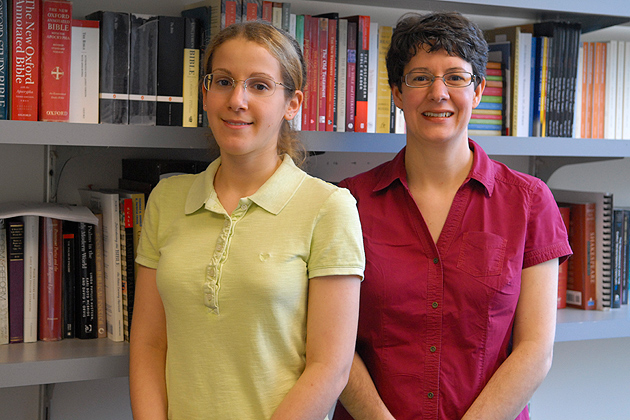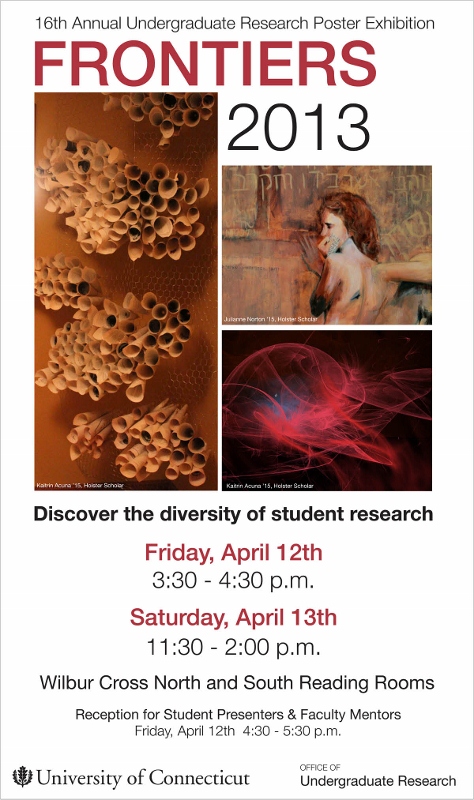 Alexis Cordone ’14 (CLAS) and her research mentor Clare Costley King’oo, assistant professor of English. (Ariel Dowski ’14 (CLAS)/UConn Photo)
Alexis Cordone ’14 (CLAS) and her research mentor Clare Costley King’oo, assistant professor of English. (Ariel Dowski ’14 (CLAS)/UConn Photo)Protestants and Catholics waged bloody wars over doctrinal differences during the Reformation, but an undergraduate research project shows they shared similar views about hell. In a historical study comparing how eternal damnation was depicted in centuries-old religious texts, Alexis Cordone 2014 (CLAS), a religious studies major, found more similarities than differences between the two denominations.
Cordone attributes this unexpected convergence to the fact that what the two groups were reading about hell was virtually the same material. She cites, for example, “a sixteenth-century devotional handbook that was first published by a Jesuit [Catholic],” and then “republished by a Protestant.” Investigating the two versions of the handbook in detail, Cordone says she began to notice that “most of the content about hell in the second publication was exactly the same as that in the original.”
During this historical period, when opposing religious powers were engaged in a struggle across much of Europe, such re-publication methods led to a surprising degree of “ecumenical” thought. This continuity “was not what I would have expected for works written about such a controversial topic during the Reformation,” says Cordone.
Cordone’s opportunity to examine early printed books in detail and uncover insights into what scholars know about the Reformation period, comes thanks to a UConn program that funds undergraduate research in the social sciences, humanities, and arts.
UConn’s Office of Undergraduate Research has taken the initiative to promote and support early career undergraduate research such as Cordone’s. The Social Sciences, Humanities, and Arts Research Experience (SHARE) program encourages a research partnership between a student and faculty member, which exposes the student to research in these disciplines and provides the faculty member with an apprentice for their professional projects.
The program was initiated in 2010 by Lynne Goodstein, associate vice provost for enrichment programs and director of the Honors Program, and the then-director of the Office of Undergraduate Research, Jennifer Lease-Butts, to promote research experience in the early stages of students’ undergraduate careers in the social sciences, humanities, and arts.
Attention to early career research is beneficial for students in the long run, says the current program coordinator of the Office of Undergraduate Research, Gwen Pearson. “The fact that SHARE is specifically for early students makes it unique,” she says. “It’s usually been juniors and seniors that are heavily involved in research. There’s recognition now that if you help freshman and sophomores get ready for that, then they will have an even better experience.”
Early career research is also crucial in preparing students in the social sciences, humanities, and arts for competitive research grants against candidates in the hard sciences who have been exposed to research early on in laboratory courses.
“The students who were able to start in labs in their freshman and sophomore year, by the time they were writing a proposal for a Summer Undergraduate Research Fund grant they were more grounded in their work and able to discuss methodology with more authority,” Goodstein says. “We thought that [SHARE] was the equivalent of the lab experiences students in the sciences had.”
Another rewarding feature of the SHARE program is the opportunity faculty members and students have to establish a working partnership. “The research proposal is jointly submitted by the faculty member and the student,” says Goodstein. “[What’s great] about being a faculty member working with ambitious students is the personal satisfaction you get from being able to watch the student develop.”
Clare Costley King’oo, associate director of graduate studies and assistant professor in the English department, agrees that the partnership is a rewarding one. “Training an undergraduate apprentice is no doubt challenging. But the benefits far outweigh the costs,” says King’oo who mentored Cordone in her immersion into Reformation literature.
For her part, Cordone is grateful for the opportunity to help with researching literature relevant to the Protestant Reformation. “It’s given me a better understanding of the development of modern Catholic and Protestant teachings,” she says. “I am also gaining a lot of firsthand experience in understanding the course and development of a research project in the humanities.”
Undergraduate research is intense: for many students, it opens up a whole new world of information they did not know was available to them, notes King’oo. “These grants enable undergraduate students to get a better picture, early on in their careers, of the kind of work we non-scientists do as scholars,” she says. “I hope, in particular, that it will persuade some undergraduates to prepare for graduate work in the social sciences, humanities, and arts.”
Stephanie Godbout, one of last year’s SHARE recipients, is enthusiastic about the research she conducted with mentor JoAnn Robinson, a professor in the Department of Human Development and Family Studies. Godbout’s project was a study of the relationships formed within the JumpStart program between mentors and preschool children. She too says that the partnership opened her eyes to the research opportunities available in the social sciences.
“Prior to my involvement in the SHARE program, I had little knowledge of how research in the social sciences was conducted,” she says. “The program gave me the opportunity to learn how to develop a research question, design a study, collect and analyze data, and ultimately complete a cohesive thesis. In addition, it allowed me to form wonderful relationships with my thesis supervisor, graduate students, and fellow undergraduate researchers.”
As for the impact of the program, King’oo says, “I would certainly recommend the experience – not just to faculty members, but to students, too.”
Applications for the 2013 SHARE program will be available for students and faculty on August 30, 2012. Applications are due in October and winners will be announced in December.
Adapted from a UConn Today story by Lynnette Repollet

